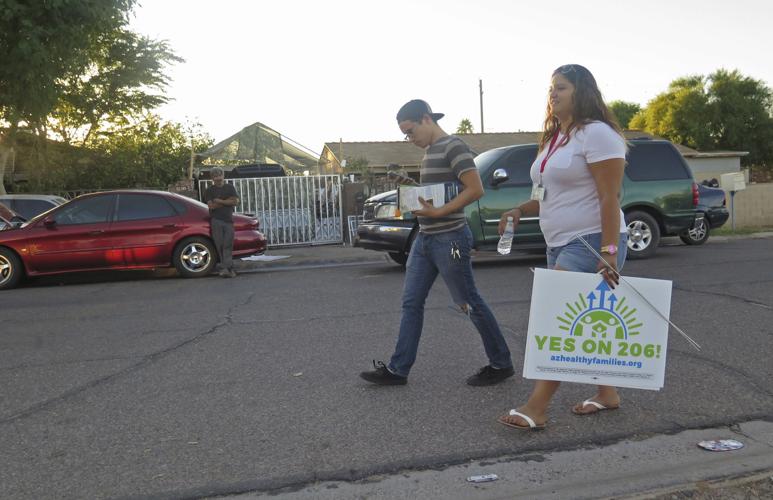The Arizona Chamber of Commerce and Industry and its close ally, the Tucson Hispanic Chamber of Commerce, richly deserved their loss in court Thursday — not necessarily for legal reasons, but for political ones.
Those two chambers and a set of additional business allies have been contesting the legality of Prop. 206, the initiative increasing Arizona’s minimum wage, since it passed in November. With the Arizona Supreme Court declining to issue a stay Thursday, the chambers have exhausted their legal remedies until the court can hear full arguments in February.
What’s troubling about their actions is not that they were politically opposed to raising the minimum wage and requiring sick days for employees under state law. Their opposition is understandable.
What’s troubling is that the chambers barely put up a fight during the election campaign when such political issues are supposed to be hashed out. Only after the proposition passed by a 58 percent to 42 percent margin did they marshal their forces for the fight.
What do I mean? Well, compare the amount that the Arizona Chamber spent fighting the marijuana-legalization initiative — $798,344 — to what it spent against the minimum-wage increase — $30,037. Lea Marquez Peterson, who heads the Tucson Hispanic Chamber, led the weak No on Prop. 206 campaign.
More broadly, the chambers roused their friends and allies to contribute richly to the anti-marijuana-legalization campaign, which had a total war chest of $5,605,735. The anti-minimum wage campaign had a total of $46,677 to spend.
So the chambers and their allies apparently gave up on campaigning against one initiative in favor of fighting it later in court. In doing so, they seem to be carrying out the wishes of Gov. Doug Ducey. Arizona Chamber CEO Glenn Hamer and Marquez Peterson of the Tucson Hispanic Chamber tend to work hand-in-glove with the governor, who was on record opposing the minimum-wage increase.
Now, his administration is also providing the evidentiary ammunition that the chambers are using to try to undermine the voters’ will. The Arizona Health Care Cost Containment System and the Industrial Commission of Arizona are providing the information on what Prop. 206 could cost them that is underlying the chambers’ continuing legal fight.
All this effort would have been more edifying and defensible before the election.
New GOP chair
The new chairman of the Pima County GOP has been a behind-the-scenes party worker and is anxious to boost the party’s fundraising.
On Dec. 17, the party elected David Eppihimer as its chairman for the next two years. Eppihimer, 67, replaces Bill Beard, who served one two-year term and decided not to run again.
Eppihimer moved his family to Tucson in 1991 to continue his career as an executive for the Muscular Dystrophy Association, which brought its headquarters here that year. After retiring in 2009, Eppihimer ran the local lifelong learning group called Oasis.
Eppihimer also served as finance director for Tucsonan John Munger’s campaign for the Republican nomination for governor in 2010 and has served on Rep. Martha McSally’s campaign finance committee.
His fundraising expertise helped the party raise enough money to get out of a hole this summer. Fundraising will also be his top priority in the coming years, he said.
“We’ve got to get an income stream back that will allow us to function from month to month, quarter to quarter and year to year, without running out of money,” he said. “Once we have that done, we’ve got to be more relevant again in local politics.”
Candidates lining up
for City Council races
Two new candidates have filed to run for Tucson City Council, and one longtime member is asking to be returned to the council.
With Ward 3 Council Member Karin Uhlich leaving, two Democratic candidates have filed to replace her: Felicia Chew and Morgan Abraham. Chew is a teacher at Mansfeld Middle School and Abraham is co-owner of a real-estate company who led the anti-Prop. 123 campaign early this year.
One rumored candidate who considered running has decided against it. Laura Dent, an aide to Ward 1 Councilwoman Regina Romero, wanted to carry on Uhlich’s progressive legacy, but she decided it was unaffordable, she said.
And that, Dent thinks, is an issue: The low pay for council members means there are “not enough people with different backgrounds.”
“It really affects the decisions that local government makes,” she said.
A Libertarian, Julian Mazza, has also filed to run in the Ward 3 race.
In Ward 6, two-term Councilman Steve Kozachik has filed to run for a third term. In an email to supporters, he said he plans to run a nontraditional campaign without signs, mailers or TV ads.
Congressman
invites hacking
U.S. Rep. Trent Franks, a Republican who represents Arizona’s 8th Congressional District, probably did not think through the implications of comments he made to MSNBC Thursday.
Speaking about the impacts Russian hacking may have had on the presidential campaign, Franks said casually, “If Russia succeeded in giving the American people information that was accurate, then they merely did what the media should have done.”
If the intelligence agencies’ information is accurate, though, he’s really changed the job description for those of us in the news media. Now, under The Franks Principle, news reporters like me should be expected to hack into the computer systems of politicians and their campaigns to extract and publish their internal communications.
Obviously, our first target should be a certain Republican congressman from Arizona.







